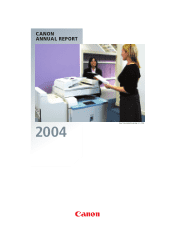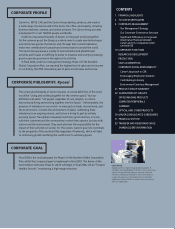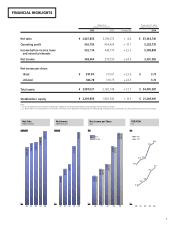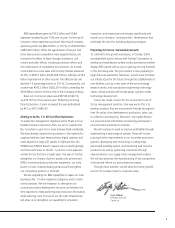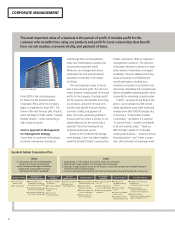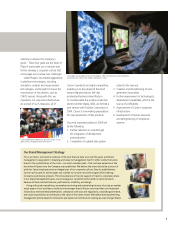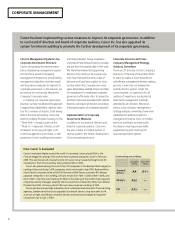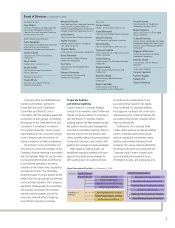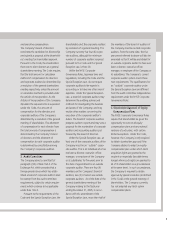Canon 2004 Annual Report Download - page 11
Download and view the complete annual report
Please find page 11 of the 2004 Canon annual report below. You can navigate through the pages in the report by either clicking on the pages listed below, or by using the keyword search tool below to find specific information within the annual report.
9
and executive compensation.
The Company’s board of directors
nominates the candidate for directorship
and submits a proposal at the sharehold-
ers’ meeting for shareholder approval.
Pursuant to the Code, the shareholders
then vote to elect directors at a general
shareholders meeting. The Code requires
that the total amount or calculation
method of compensation for directors
and corporate auditors be determined by
a resolution of the general shareholders
meeting respectively, unless the amount
or calculation method is provided under
the Articles of Incorporation. As the
Articles of Incorporation of the Company
stipulates the requirements as expressed
under the Code, the amount of
compensation for the directors and
corporate auditors of the Company is
determined by a resolution of the general
meeting of shareholders. The allotment
of compensation for each director from
the total amount of compensation is
determined by the Company’s board
of directors and the allotment of
compensation to each corporate auditor
is determined by consultation among
the Company’s corporate auditors.
3. Audit Committee
The Company plans to avail itself of
paragraph (c)(3) of Rule 10A-3 of the
Exchange Act, which provides that a
foreign private issuer which has estab-
lished a board of corporate auditors shall
be exempt from the audit committee
requirements, subject to certain require-
ments which continue to be applicable
under Rule 10A-3.
Pursuant to the requirements of the
Code and the Special Exception Law, the
shareholders elect the corporate auditors
by resolution of a general meeting. The
Company currently has four (4) corpo-
rate auditors, although the minimum
number of corporate auditors required
pursuant to the Code and the Special
Exception Law is three (3).
Unlike the NYSE Corporate
Governance Rules, Japanese laws and
regulations, including the Code and the
Special Exception Law, do not require
corporate auditors to be experts in
accounting or to have any other area of
expertise. Under the Special Exception
Law, a board of corporate auditors may
determine the auditing policies and
methods for investigating the business
and assets of the Company, and may
resolve other matters concerning the
execution of the corporate auditor’s
duties. The board of corporate auditors
prepares auditors' reports and may veto a
proposal for the nomination of corporate
auditors and accounting auditors put
forward by the board of directors.
Under the Special Exception Law, at
least one of the corporate auditors of the
Company must be an “outside” corpo-
rate auditor. This is an individual who has
not been a director, executive officer,
manager, or employee of the Company
or its subsidiaries for five-years prior to
the date of appointment as an outside
corporate auditor. There are four (4)
members on the Company’s board of
auditors, two (2) of whom are outside
corporate auditors. As of the date of the
general shareholders meeting of the
Company relating to the fiscal year
ending December 31, 2005, in accor-
dance with the amendment of the
Special Exception Law, more than half of
the members of the board of auditors of
the Company must be outside corporate
auditors. From the same date, the five
year period referred to above will also be
amended so that it will be prohibited for
an outside corporate auditor to have ever
been a director, executive officer,
manager, or employee of the Company or
its subsidiaries. The Company’s current
corporate auditor system meets these
new requirements. The qualifications for
an “outside” corporate auditor under
the Special Exception Law are different
from the audit committee independence
requirement under the NYSE Corporate
Governance Rules.
4. Shareholder Approval of Equity
Compensation Plans
The NYSE Corporate Governance Rules
require that shareholders be given the
opportunity to vote on all equity
compensation plans and any material
revisions of such plans, with certain
limited exceptions. Under the Code,
however, the Company is only required
to obtain shareholder approval if the
Company desires to adopt an equity-
compensation plan under which stock
acquisition rights are granted to the
recipient on especially favorable terms
(except where such rights are granted to
all of its shareholders on a pro-rata basis
at the same time). In such circumstances,
the Company is required to obtain
approval by special resolution (as defined
in the Code) at the general meeting of
shareholders. The Company currently
has not adopted any stock option
compensation plans.

